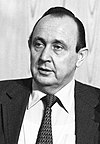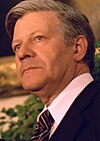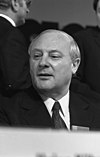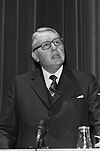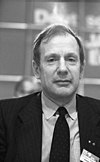Brandt I cabinet
| Brandt I cabinet | |
|---|---|
| 9. Cabinet of the Federal Republic of Germany | |
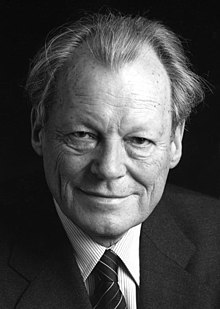
|
|
| Chancellor | Willy Brandt |
| choice | 1969 |
| Legislative period | 6th |
| Appointed by | Federal President Gustav Heinemann |
| education | October 22, 1969 |
| The End | December 13, 1972 |
| Duration | 3 years and 52 days |
| predecessor | Kiesinger cabinet |
| successor | Cabinet Brandt II |
| composition | |
| Party (s) | SPD and FDP |
| representation | |
| Bundestag | 268/518 |
| Opposition leader | Rainer Barzel ( CDU ) |
The Brandt I cabinet was the 9th government cabinet in the Federal Republic of Germany.
The Bundestag election for the 6th German Bundestag took place on September 28, 1969. This was followed by a deep turning point: for the first time in the 20-year history of the Federal Republic of Germany, the Union parties no longer provided the Federal Chancellor (although they have again and uninterruptedly formed the largest parliamentary group since the 1949 federal election ).
cabinet
| Office | photo | Surname | Political party |
Parliamentary State Secretary or Minister of State |
Political party | |
|---|---|---|---|---|---|---|
| Chancellor |
Willy Brandt (1913–1992) |
SPD |
Katharina Focke (1922-2016) |
SPD | ||
| Vice Chancellor |
Walter Scheel (1919–2016) |
FDP | ||||
| Foreign |
Ralf Dahrendorf (1929–2009) until July 2, 1970 Karl Moersch (1926–2017) from July 2, 1970 |
FDP | ||||
| Interior |
Hans-Dietrich Genscher (1927-2016) |
FDP |
Wolfram Dorn (1924–2014) until August 31, 1972 |
FDP | ||
| Judiciary |
Gerhard Jahn (1927–1998) |
SPD |
Alfons Bayerl (1923-2009) |
SPD | ||
| Finances |
Alex Möller (1903–1985) (until May 13, 1971) |
SPD |
Gerhard Reischl (1918–1998) until May 13, 1971 Hans Hermsdorf (1914–2001) from May 13, 1971 |
SPD | ||
|
Karl Schiller (1911–1994) (until July 7, 1972) |
SPD | |||||
|
Helmut Schmidt (1918–2015) (from July 7, 1972) |
SPD | |||||
| economy | Karl Schiller (until July 7, 1972) |
SPD |
Klaus Dieter Arndt (1927–1974) until September 14, 1970 Philip Rosenthal (1916–2001) September 14, 1970 to November 17, 1971 Rainer Offergeld (* 1937) from March 15, 1972 |
SPD | ||
| Helmut Schmidt (from July 7, 1972) |
SPD | |||||
| Food, Agriculture and Forestry |
Josef Ertl (1925-2000) |
FDP |
Fritz Logemann (1907-1993) |
FDP | ||
| Work and social order |
Walter Arendt (1925-2005) |
SPD |
Helmut Rohde (1925-2016) |
SPD | ||
| defense | Helmut Schmidt (until July 7, 1972) |
SPD |
Karl-Wilhelm Berkhan (1915–1994) |
SPD | ||
|
Georg Leber (1920–2012) (from July 7, 1972) |
SPD | |||||
| Youth, Family and Health |
Kate Strobel (1907-1996) |
SPD |
Heinz Westphal (1924–1998) |
SPD | ||
| Transport and Post and Telecommunications | Georg Leber (until July 7, 1972) |
SPD |
Holger Börner (1931–2006) until February 4, 1972 Ernst Haar (1925–2004) from February 7, 1972 |
SPD | ||
|
Lauritz Lauritzen (1910–1980) (from July 7, 1972) |
SPD | |||||
| Urban planning and housing | Lauritz Lauritzen | SPD |
Karl Ravens (1927-2017) |
SPD | ||
| Relations within Germany |
Egon Franke (1913–1995) |
SPD |
Karl Herold (1921–1977) |
SPD | ||
| education and Science |
Hans Leussink (1912–2008) (until March 15, 1972) |
independent |
Klaus von Dohnanyi (* 1928) until March 15, 1972 Joachim Raffert (1925–2005) March 15, 1972 to August 31, 1972 |
SPD | ||
|
Klaus von Dohnanyi (* 1928) (from March 15, 1972) |
SPD | |||||
| Economic Cooperation |
Erhard Eppler (1926–2019) |
SPD |
Brigitte Freyh (1924-2009) |
SPD | ||
|
Special tasks head of the Federal Chancellery |
Horst Ehmke (1927-2017) |
SPD | ||||
prehistory
On November 30, 1966 there was a change of Chancellor in the current legislative period : Federal Chancellor Ludwig Erhard resigned after the coalition of CDU / CSU and FDP broke up on questions of budget and tax policy.
Kurt Georg Kiesinger was elected as his successor (until then Prime Minister of Baden-Württemberg); he formed a grand coalition of CDU / CSU and SPD ( Kiesinger cabinet ). Federal Foreign Minister and Vice Chancellor became the previous Governing Mayor of Berlin Willy Brandt . The appointment to the federal government was decisive for Willy Brandt to run again, contrary to a renunciation of a renewed candidacy for chancellor declared after the federal election in 1965 .
Brandt stood for the third time as candidate for chancellor of the SPD, Kiesinger for the first time for the CDU / CSU.
The 1969 election came out close. That night, Brandt and FDP leader Walter Scheel agreed to start coalition negotiations .
Changes
After almost nine months in office, Ralf Dahrendorf , the former Parliamentary State Secretary at the Federal Minister for Foreign Affairs, moved to the European Commission as Commissioner for Trade with effect from July 1, 1970 at his own request . His successor was (after Hans Apel , Hans-Jürgen Junghans (at that time economics spokesman for the SPD parliamentary group) and others had rejected Karl Moersch .
After there had been speculation about the resignation of the Parliamentary State Secretary to the Federal Minister of Economics, Klaus Dieter Arndt , due to possible differences with Federal Economics Minister Schiller , he finally resigned on September 14, 1970 and devoted himself entirely to his office as President of the German Institute for Economic research . It was already clear in August 1970 that Philip Rosenthal would be his successor.
Since he was no longer able to support the growing spending requests of the other departments, Federal Finance Minister Alex Möller submitted his resignation on May 13, 1971. Thereupon Federal Economics Minister Karl Schiller also took over the management of the Federal Ministry of Finance as a so-called “ super minister ”. Also on May 13, 1971, the Parliamentary State Secretary at the Federal Minister of Finance, Gerhard Reischl , left office. The previous deputy chairman of the budget committee, Hans Hermsdorf , was appointed as his successor .
After the relationship between the Minister for Economic Affairs and Finance, Karl Schiller, and the Parliamentary State Secretary at the Federal Minister of Economics, Philip Rosenthal , had long been considered broken, Rosenthal resigned on the occasion of a renewed delay in drawing up a plan for employees to participate in productive capital. November 1971 back.
On January 24, 1972, Holger Börner was elected Federal Managing Director of the SPD. His successor in the office of Parliamentary State Secretary at the Federal Minister of Transport and Post and Telecommunications was Ernst Haar on February 7, 1972 .
After the independent Federal Education Minister Hans Leussink had already announced his resignation in January 1972, the previous Parliamentary State Secretary Klaus von Dohnanyi was appointed as the new Federal Minister for Education and Science on March 15, 1972 . Dohnanyi's successor in the office of Parliamentary State Secretary was Joachim Raffert .
After the resignation of the civil servant State Secretary Heinz Haller, Rainer Offergeld was appointed Parliamentary State Secretary to the Federal Minister of Economics and Finance on March 15, 1972 - primarily with responsibility for the stalled tax reform project.
On July 7, 1972, the Federal Minister of Economics and Finance, Karl Schiller, resigned after he had lost the support of Chancellor Brandt and had suffered a defeat in the Federal Cabinet the week before on a monetary policy issue. His successor was the previous Minister of Defense, Helmut Schmidt . The previous Federal Minister for Transport and Post and Telecommunications, Georg Leber , was appointed the new Federal Minister of Defense . Federal Building Minister Lauritz Lauritzen was also responsible for transport and post .
In August 1972, the two Parliamentary State Secretaries Wolfram Dorn (Interior) and Joachim Raffert (Education and Science) came under fire because of consulting contracts with Heinrich Bauer Verlag ; both resigned on August 31, 1972. In view of the federal election scheduled for November 19, 1972, no successor was appointed.
See also
Individual evidence
- ^ Dahrendorf: Off to Brussels . In: Der Spiegel . No. 23 , 1970, pp. 33 ( Online - June 1, 1970 ).
- ↑ Spiegel 29/1970 of July 13, 1970: Nobody can stand it
- ↑ "Grandpa's textbook stays closed." Spiegel interview with State Secretary Klaus Dieter Arndt about economic policy . In: Der Spiegel . No. 19 , 1970, pp. 26 ( online - 4 May 1970 ).
- ↑ State Secretaries: Nice pushed . In: Der Spiegel . No. 32 , 1970, pp. 29-30 ( Online - Aug. 3, 1970 ).
- ↑ We only have a narrow corridor . In: Der Spiegel . No. 21 , 1971, p. 21-29 ( Online - May 17, 1971 ).
- ↑ This Schiller is like an astronaut . In: Der Spiegel . No. 21 , 1971, p. 31-34 ( Online - May 17, 1971 ).
- ^ "Course of the SPD shifted to the right." Spiegel interview with ex-State Secretary Philip Rosenthal . In: Der Spiegel . No. 48 , 1971, p. 26 ( Online - Nov. 22, 1971 ).
- ↑ Fifth Man . In: Der Spiegel . No. 13 , 1972, p. 30-31 ( Online - Mar. 20, 1972 ).
- ↑ Karl, we can't get rid of you cheaper . In: Der Spiegel . No. 28 , 1972, p. 19-21 ( Online - July 3, 1972 ).
- ↑ My boy, if that's so right . In: Der Spiegel . No. 37 , 1972, p. 17-23 ( online - 4 September 1972 ).


